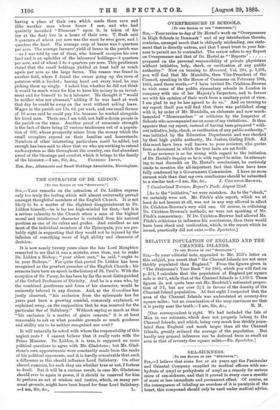THE OSTRACISM OF DR. LIDDON. [To THE EDITOR OF THE
"SPECTATOR."]
SIR,—Your remarks on the ostracism of Dr. Liddon express only too truly the feeling which will almost universally prevail amongst thoughtful members of the English Church. It is not likely to be a matter of the slightest disappointment to Dr. Liddon himself,—he is far too high-minded for that,—but it is a serious calamity to the Church when a man of the highest moral and intellectual character is excluded from his natural position as one of its rulers and guides. And excellent as are most of the individual members of the Episcopate, you are pro- bably right in suggesting that they would not be injured by the infusion of something more of high ability and clearness of decision.
It is now nearly twenty years since the late Lord Houghton remarked to me that it was a mistake, even then, not to make Dr. Liddon a Bishop ; " your ablest men," he said, " ought to be your Bishops." For quite that period Dr. Liddon has been recognised as the greatest preacher of the English Church ; his sermons have been an epoch in the history of St. Paul's. With the exception of Dr. Posey, he has been by far the most distinguished of the Oxford Professors of Divinity. And he is a man who, by the combined gentleness and force of his character, would be eminently beloved in any diocese. And, as the Guardian has justly observed, " his exclusion from the episcopate has for years past been a growing scandal, commonly explained, or explained away, on the supposition that he was reserved for the particular See of Salisbury." Without saying so much as that " his exclusion is a matter of grave censure," it is at least reasonable to ask on what possible grounds so much goodness and ability are to be neither recognised nor used ?
It will naturally be asked with whom the responsibility of this neglect rests ? I cannot believe that it really rests with the Prime Minister. Dr. Liddon, it is true, is supposed on some political questions to agree with Mr. Gladstone ; but Mr. Glad- stone's own appointments were constantly made from the ranks of his political opponents, and it is hardly conceivable that such a difference as this should influence Lord Salisbury. On other absurd rumours, for such they are whether true or not, I forbear to dwell. But it will be a curious result, in case Mr. Gladstone should ever be again in power, if it should be reserved for him to perform an act of wisdom and justice, which, on many per- sonal grounds, might have been hoped for from Lord Salisbury.


































 Previous page
Previous page